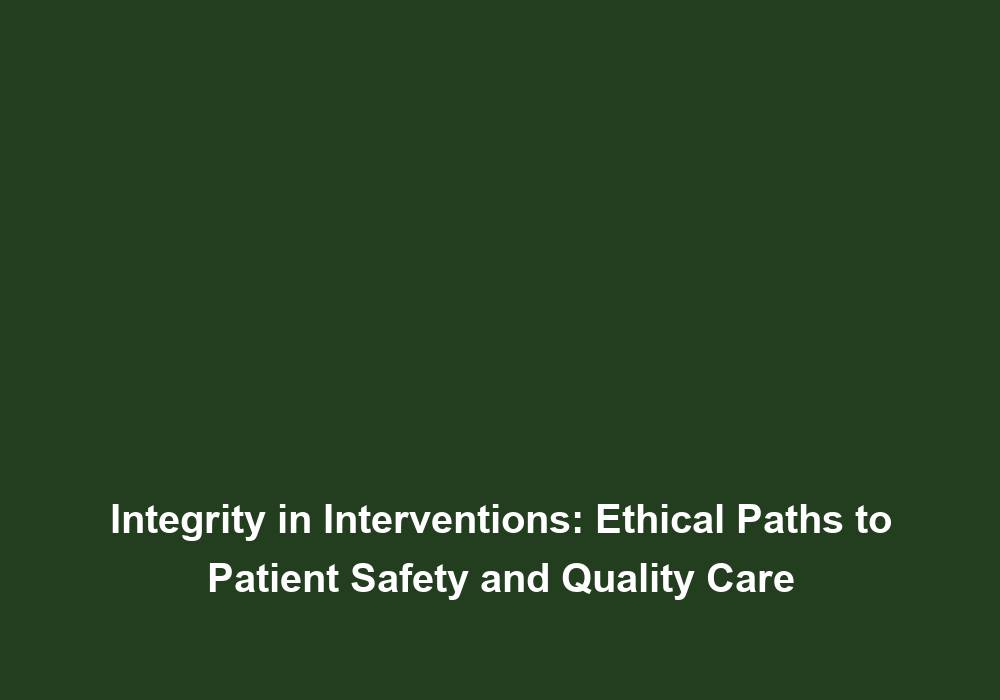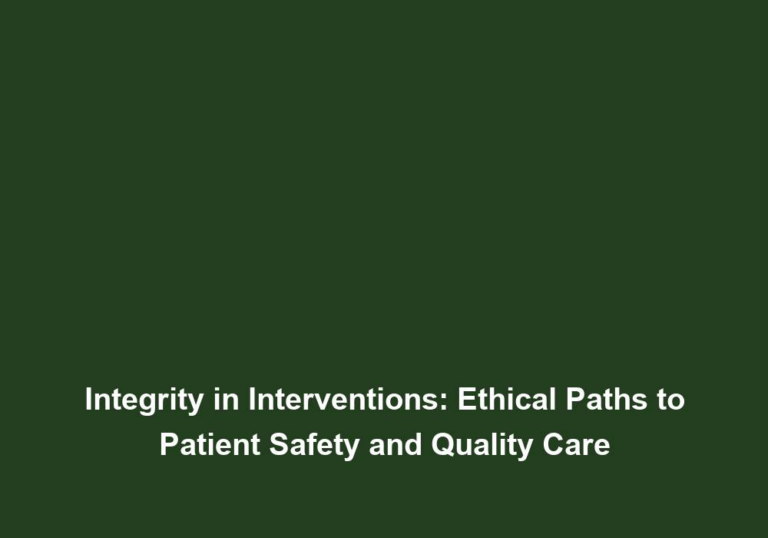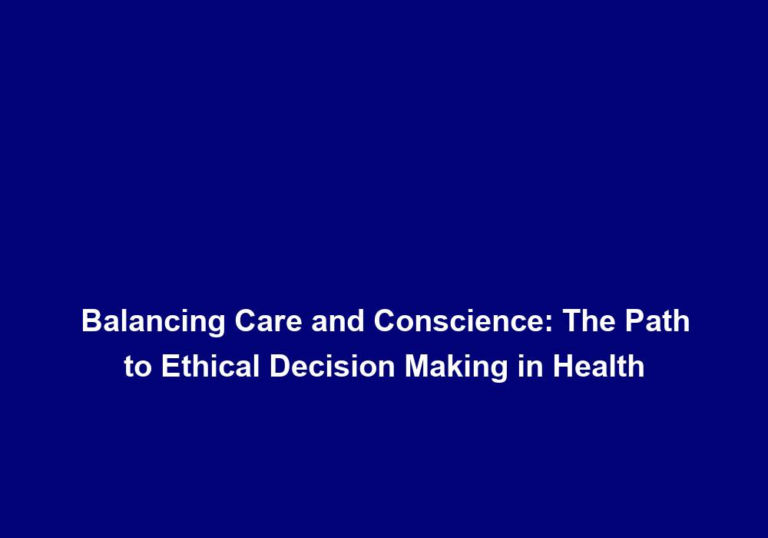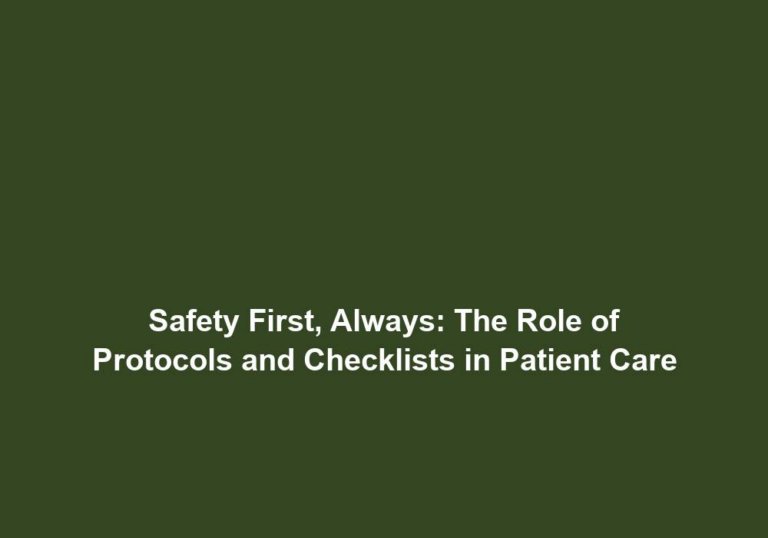Integrity in Interventions: Ethical Paths to Patient Safety and Quality Care
Introduction
In the healthcare industry, maintaining integrity is paramount to ensure patient safety and provide quality care. Ethical considerations play a vital role in guiding healthcare professionals towards making responsible decisions and executing interventions that prioritize the well-being of patients. This article aims to explore the significance of integrity in interventions, highlighting the ethical paths that lead to enhanced patient safety and quality care.
The Importance of Integrity in Healthcare Interventions
Integrity serves as the moral compass for healthcare professionals, guiding them in their decision-making process when it comes to interventions. It encompasses honesty, transparency, and adherence to ethical principles. By upholding integrity, healthcare providers can ensure that their interventions are aligned with the best interests of patients and maintain public trust. Let’s delve into the ethical paths that lead to patient safety and quality care.
Integrity in healthcare interventions is crucial for several reasons:
-
Patient Trust: Building and maintaining trust between healthcare professionals and patients is essential for effective interventions. By acting with integrity, healthcare providers can establish credibility and foster a strong patient-provider relationship, leading to better patient compliance and outcomes.
-
Ethical Responsibilities: Healthcare professionals have a duty to act ethically and in the best interest of their patients. By upholding integrity, they are fulfilling their ethical responsibilities and demonstrating a commitment to providing safe and quality care.
-
Legal and Regulatory Compliance: Acting with integrity ensures compliance with legal and regulatory requirements, such as obtaining informed consent and protecting patient privacy. By adhering to these standards, healthcare professionals can avoid legal complications and protect patient rights.
Ethical Paths to Patient Safety
1. Informed Consent
One of the primary ethical requirements in healthcare interventions is obtaining informed consent from patients. Ensuring that patients fully understand the risks, benefits, and alternatives of any intervention allows them to make autonomous decisions regarding their care. Healthcare professionals must provide clear and comprehensive information, address any queries or concerns, and respect the patient’s right to refuse or accept the proposed intervention.
Informed consent can be achieved through:
-
Clear Communication: Healthcare professionals should communicate effectively, using simple and understandable language to explain the intervention, its potential risks and benefits, and any available alternatives.
-
Time for Reflection: Patients should be given sufficient time to consider the information provided, ask questions, and discuss their concerns with healthcare professionals or their loved ones.
-
Written Documentation: Documenting the informed consent process ensures accountability and serves as evidence that the patient was adequately informed and agreed to the intervention.
2. Confidentiality and Privacy
Maintaining patient confidentiality and privacy is crucial in healthcare interventions. Respecting the boundaries of privacy fosters trust between healthcare professionals and patients. It is essential to handle patient information with utmost confidentiality and only disclose it when authorized or required by law. Strict adherence to privacy regulations, such as the Health Insurance Portability and Accountability Act (HIPAA), ensures that patient safety is not compromised.
To ensure confidentiality and privacy, healthcare professionals should:
-
Secure Data Storage: Implement secure systems and protocols to safeguard patient information from unauthorized access or breaches.
-
Limited Access: Limit access to patient information to only those who require it for providing the intervention or for legal purposes.
-
Consent for Information Sharing: Obtain explicit consent from patients before sharing their information with other healthcare professionals or third parties involved in their care.
3. Competency and Continuing Education
Healthcare professionals must continuously update their knowledge and skills to provide safe and quality interventions. Staying informed about the latest advancements, guidelines, and evidence-based practices is crucial for ensuring patient safety. Participating in continuing education programs, attending conferences, and engaging in professional development activities contribute to maintaining competency and upholding integrity in interventions.
To ensure competency and ongoing education:
-
Continuing Education Programs: Healthcare professionals should actively participate in accredited continuing education programs relevant to their field to stay updated with the latest developments and best practices.
-
Professional Certifications: Pursuing professional certifications demonstrates a commitment to maintaining competency and upholding ethical standards in interventions.
-
Peer Collaboration: Engaging in peer collaboration and knowledge sharing helps healthcare professionals learn from each other’s experiences, exchange ideas, and stay abreast of emerging trends in their field.
-
Research and Evidence-Based Practice: Keeping up with scientific research and evidence-based practice allows healthcare professionals to make informed decisions and provide interventions that are backed by reliable evidence.
4. Multidisciplinary Collaboration
Interventions often require collaboration among healthcare professionals from various disciplines. Ethical paths to patient safety involve effective communication, mutual respect, and teamwork. By working together, healthcare providers can leverage their combined expertise and perspectives to make well-informed decisions that prioritize patient well-being. Interdisciplinary collaboration also helps identify potential risks and implement preventive measures, ultimately enhancing patient safety during interventions.
To promote multidisciplinary collaboration:
-
Effective Communication: Healthcare professionals should communicate clearly and openly, sharing information, insights, and concerns to ensure a comprehensive understanding of the intervention.
-
Respect and Appreciation: Valuing the expertise and perspectives of colleagues from different disciplines fosters a collaborative environment where everyone’s input is valued.
-
Team Meetings and Case Discussions: Regular team meetings and case discussions provide opportunities for healthcare professionals to share knowledge, discuss challenging cases, and collaborate on interventions.
-
Shared Decision-Making: Involving all relevant healthcare professionals in the decision-making process ensures a holistic approach to interventions and minimizes the risk of errors or oversights.
Ethical Paths to Quality Care
1. Evidence-Based Practice
Integrating evidence-based practice into interventions ensures that patients receive the most effective and efficient care. Ethical healthcare professionals rely on scientific research, clinical guidelines, and best practices to inform their decision-making process. By basing interventions on reliable evidence, healthcare providers can improve outcomes, minimize risks, and optimize the overall quality of care delivered to patients.
To incorporate evidence-based practice:
-
Literature Review: Healthcare professionals should regularly review relevant scientific literature to stay updated with the latest research findings and best practices.
-
Clinical Guidelines: Following established clinical guidelines ensures that interventions are aligned with evidence-based recommendations and standards of care.
-
Critical Appraisal: Healthcare professionals should critically evaluate the quality and relevance of research studies before applying their findings to interventions.
2. Cultural Sensitivity and Diversity Awareness
To provide quality care, healthcare professionals must recognize and respect the diverse cultural backgrounds and beliefs of their patients. Ethical paths to quality care involve promoting cultural sensitivity and diversity awareness. Healthcare providers should strive to deliver interventions that are culturally appropriate, taking into account individual preferences, religious beliefs, and socio-cultural factors. By embracing diversity, healthcare professionals can enhance patient satisfaction and ensure that interventions are tailored to meet each patient’s specific needs.
To promote cultural sensitivity and diversity awareness:
-
Cultural Competency Training: Healthcare professionals should undergo training programs that focus on cultural competence, helping them understand and appreciate different cultural practices and beliefs.
-
Language Services: Providing language services, such as interpreters or translated materials, helps overcome language barriers and ensures effective communication with patients from diverse backgrounds.
-
Cultural Consultations: Seeking input from cultural consultants or community representatives can provide valuable insights and guidance on delivering culturally sensitive interventions.
3. Continuous Quality Improvement
Ethical healthcare interventions should be accompanied by a commitment to continuous quality improvement. This involves regularly evaluating the outcomes of interventions, identifying areas for improvement, and implementing changes to enhance the quality of care provided. Engaging in quality improvement initiatives demonstrates a dedication to patient safety and ensures that interventions align with the highest standards of care.
To promote continuous quality improvement:
-
Outcome Monitoring: Healthcare professionals should regularly monitor and evaluate the outcomes of interventions to identify any gaps or areas for improvement.
-
Quality Indicators: Establishing and tracking quality indicators specific to the intervention helps assess its effectiveness and identify opportunities for enhancement.
-
Feedback and Reflection: Encouraging feedback from patients, colleagues, and other stakeholders involved in the intervention process provides valuable insights for improvement.
-
Process Review and Standardization: Regularly reviewing intervention processes and standardizing best practices helps identify inefficiencies and implement changes that optimize the quality of care.
Conclusion
Integrity in interventions is essential for ensuring patient safety and delivering quality care in the healthcare industry. By following ethical paths, healthcare professionals can uphold honesty, transparency, and respect in their decision-making processes. Prioritizing informed consent, confidentiality, competency, multidisciplinary collaboration, evidence-based practice, cultural sensitivity, and continuous quality improvement will lead to interventions that are ethically sound, ultimately benefiting patients and promoting their well-being.







